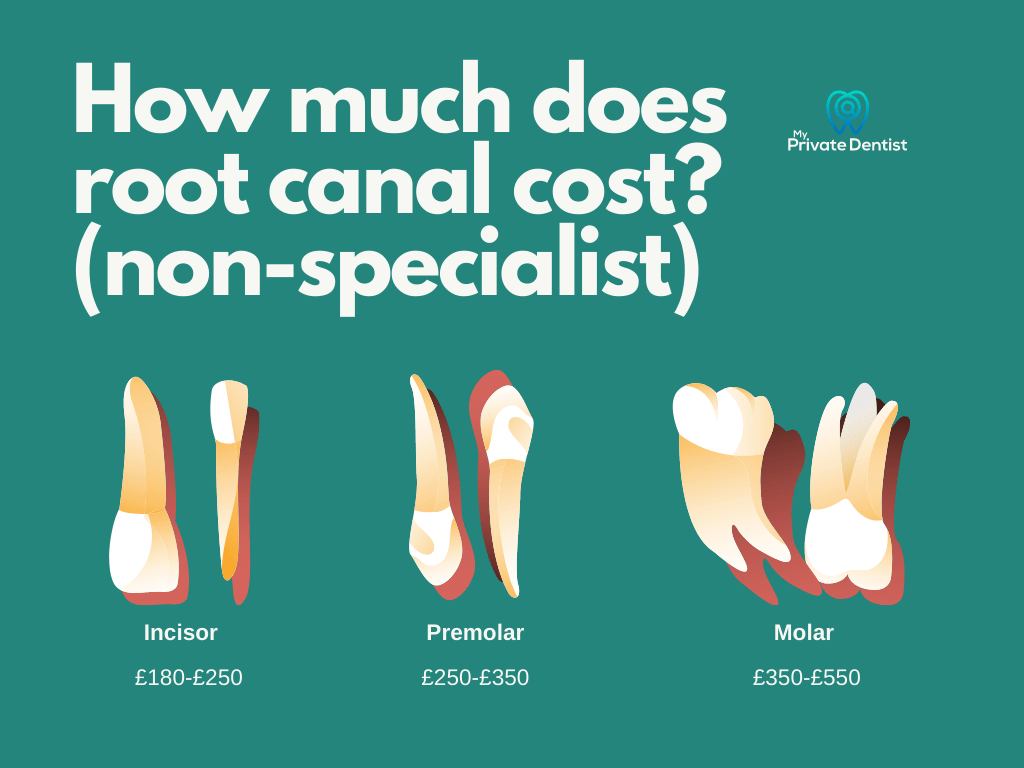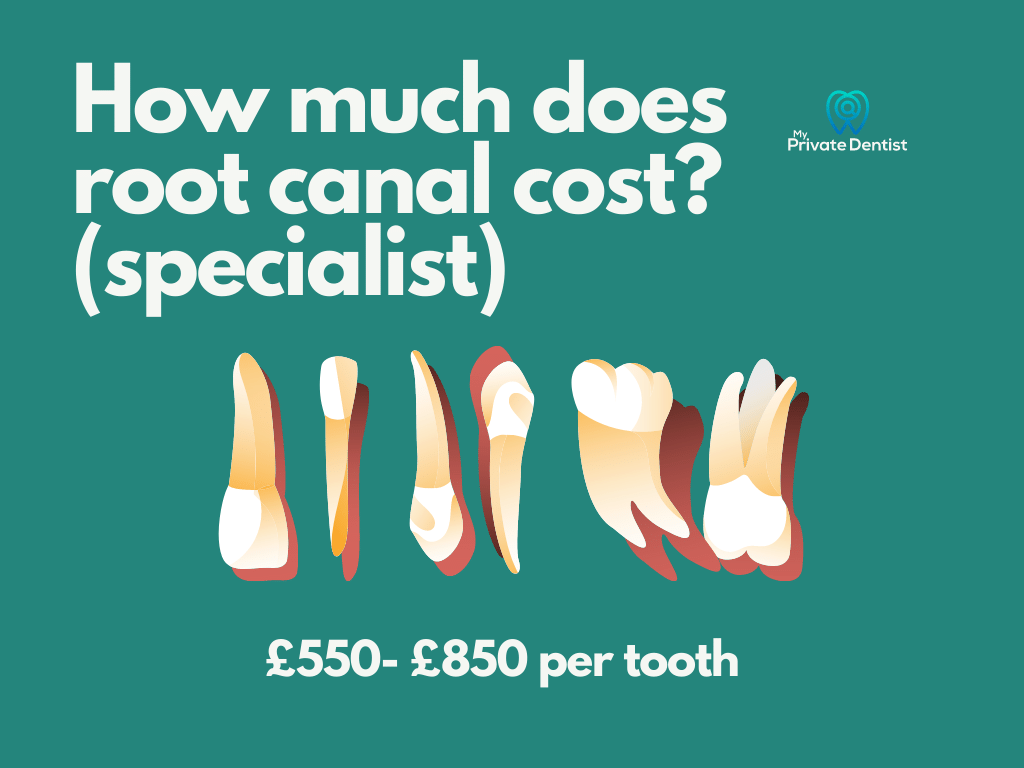How much does a root canal cost in the UK?
The cost of a private root canal treatment in the UK can vary depending on which tooth needs treatment, and the expertise of the dentist:
An incisor or canine root canal costs between £180 – £250
A premolar root canal costs between £250- £350
A molar costs root canal costs between £350 – £550
A complicated or re-root canal treatment by a specialist will cost between £550 – £850
NHS provision of a root canal treatment costs a band 2 charge of £65.20.

But…
How does NHS root canal treatment compare to a private root treatment?
And what main factors contribute to your root canal treatment being successful?
As a dentist, I often get asked these questions. In this article, I aim to discuss the factors patients should consider before having root canal treatment. As well as considering cost, I will discuss what you should know about root canals to help ensure long term success of treatment.
A failed root canal can often lead to losing a tooth, therefore it is important to explore all options.
Why does root canal cost vary so much?
The cost of root canal can vary widely, from £65 to £850.
There are 3 categories of cost for root canal treatments:
1. NHS Band 2 root canal treatment – £65.20
- Available if you are registered as an NHS patient
- NHS registration is increasingly more difficult to come by due to lack of government funding, and many NHS practices are at full capacity
- Due to low renumeration for NHS dentists the root canal treatments are carried out as cost effectively and efficiently as possible. The dentist may have targets and time constraints.
- May be done in one visit (how long does root canal take?)
- Basic materials and instruments may be used
2. Private Root Canal – £180- £550
- Carried out in a private dental setting
- Can be by a general dentist or a dentist with enhanced training in root canal treatments
- Often an initial consultation is needed but most practices are open to taking on new patients
- The dentist may use specialist materials and instruments such as a microscope to effectively clean and treat your tooth
- Less time constraints compared to NHS, private dentists often offer longer appoinrments.
- More likely to be done over two or more visits which may help to improve outcome (How long does root canal take?)
3. Private specialist root canal treatment – £550-£850
- Carried out by specialist endodontists, who are the most experienced and qualified dentists in carrying out root canal procedures
- Most specialists ONLY carry out root canal treatments
- General dentists refer the most complex cases for private specialist treatment e.g Re-Root canal treatments
- Often have highest success rates, reducing the risk of failure leading to needing to remove the tooth. Success rates can be up to 95%.

QUICK RECAP: What is root canal treatment?
Ask any dentist you can find and they will tell you a root canal treatment is one of the most difficult procedures to perform.
It is needed when a tooth becomes infected due to injury or tooth decay.
Root canal treatment involves thoroughly cleaning out a network of thin canals within a tooth. The bacteria inside the tooth is very difficult to remove. The more effectively a canal system can be cleaned and sealed, the better the outcome will be.
What makes some root canal treatments more difficult than others?
Factors that make root canals more difficult:
- The position of the tooth: back teeth are harder to treat than front ones
- The number of canals: simplest cases are teeth such as upper incisors, that often have one single canal. Some molars can have up to four canals, which all need thorough accessing and cleaning.
- Curvature of roots: curved roots are harder to clean to the end
- How long the tooth has been infected: the longer a tooth has been left untreated, the harder and more resistant it is to clean
- Reinfection Cases in which a tooth has been root canal treated previously, but this has failed and the tooth has become infected again.
- Age: In young children the canals can be immature and very wide. These are difficult to adequately seal. In elderly patients the root canals can be very thin, and in some cases blocked, or sclerosed.
What can go wrong during a root canal?
There are several risks to consider before undergoing a root canal treatment. If one or more of them occur, root canal treatment may be unsuccessful.
File Fracture: Dentists use very thin files to remove the pulp and clean and shape the canals. There is a risk of these files breaking during the cleaning phase of treatment, and this blockage may cause failure of treatment. File removal is difficult, and often requires specialist treatment.
Ledge/Blockage: If a ledge or blockage develops whilst the root canals are being cleaned out, this may make completion of treatment difficult, and more likely to fail.
Not finding a canal: Sometimes canals can be difficult to find. For successful treatment all the canals must be cleaned effectively.
If any of these occur, the chances of success are reduced [1]
What is a root canal specialist?
Some dentists undertake extra training and work to achieve extra qualifications in order to specialise in providing root canal treatments.
The most difficult cases are best treated by root canal specialists, or specialist endodontists.
They have more experience in doing root canal treatments as this is the only kind of dentistry they do.
They also invest in the best materials and instruments to get the best results. For example they use microscopes to make sure all areas inside a tooth are reached and cleaned. They also more readily have access to CT scans which can help with the treatment.
In turn, the price they charge for the root treatments is more expensive.
In some cases you may CHOOSE to have your root canal done by a specialist to have the best outcome.
In other cases you may NEED to have your root canal done by a specialist because it is very difficult.
Additional costs after a root canal treatment
Crown or Onlay: Following root canal treatment a back tooth can become weaker and need protection. This is provided in the form of a crown or onlay to restore the tooth. The cost of this ranges from £450-£750
Post and Crown: If a front tooth is severely broken down, it may need a post to help a crown stay on. A post crown may cost between £650 – £850
Is a tooth extraction cheaper than a root canal?
Having a tooth removed is usually cheaper than having a root treatment as it takes less time. A dental extraction costs between £90-£150.
However it is worth factoring in the cost of tooth replacement if you were to want to replace a tooth that you have had extracted.
For example an implant and crown may cost around £2500, therefore it may be more cost effective to have a root canal treatment than an extraction in the long run.
Will my dental plan cover my root canal treatment?
Most dental plans will cover root canal treatments but it is best to check with your plan provider. However, if your root canal is complex, or requires a specialist because of difficulties encountered during treatment, this may not be covered.
What should I do now?
If you need a root canal treatment this article may have helped to explain your options.
To get an accurate quote it’s best to have a consultation with a dentist. They can take an x-ray and provide you with a price and the prognosis (chance of success) for your tooth.
Find private dentists who provide root canal treatments or specialist endodontists to carry out your treatment.



